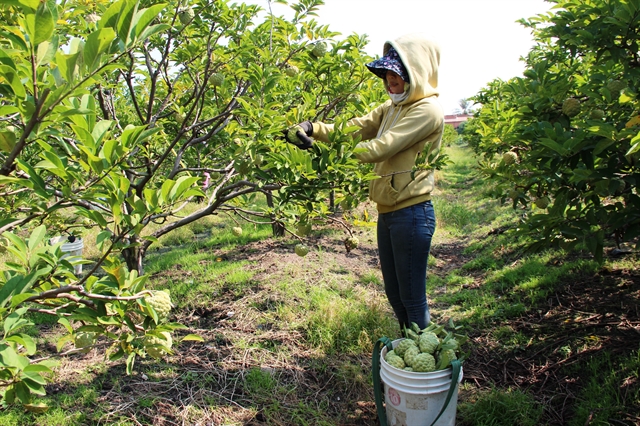 Society
Society

The southeastern province of Tây Ninh will restructure agriculture production towards developing linkages among stakeholders and using advanced techniques to meet market requirements.

|
| A custard apple orchard is planted to meet Vietnamese good agricultural practices in Tây Ninh City’s Thạnh Tân Commune in Tây Ninh Province. — VNA/VNS Photo Lê Đức Hoảnh |
TÂY NINH — The southeastern province of Tây Ninh will restructure agriculture production towards developing linkages among stakeholders and using advanced techniques to meet market requirements.
It will also develop origin traceability and organise trade promotion activities to boost the sales of agricultural products at home and abroad, according to its People’s Committee.
It will strengthen advocacy activities to enhance the awareness of the public about market information and boost the development of linkages among stakeholders in producing key agricultural products to improve product quality and yield and farmer incomes.
The linkages have helped produce agricultural products on a large scale and boosted quality to meet the requirements of domestic and export markets.
The province has established such linkages for pigs, cattle, cassava, custard apple, banana, sugarcane and rice.
It has 64 pig farms breeding a total of 118,820 pigs that have linkages among stakeholders for breeding and slaughtering pigs and selling their products.
The pig farms produce about 18,980 tonnes of pigs a year, accounting for 45 per cent of the province’s total output.
The province has most of its cassava and sugarcane farming areas under farm contracts between farmers and processing companies.
Tây Ninh has nearly 60,000ha of cassava with an annual output of nearly 2 million tonnes last year.
It has 65 cassava processing plants with a total capacity of 6.4 million tonnes a year.
Processing companies that link with farmers have stable inputs for their production and can reduce production cost, according to the province Department of Agriculture and Rural Development.
They can also manage better the quality and origin of input materials and enjoy preferential policies for developing linkages in agricultural production, it said.
Farmers who participate in the linkages have guaranteed buyers, stable income and reduced risk of price volatility, it said.
Cao Văn Thả, director of the Phước Bình Agricultural Services Co-operative in Trảng Bàng District’s Phước Chỉ Commune, said he and other local farmers established the co-operative in 2018 to develop linkages with companies to produce rice.
Thanks to the linkages, the co-operative’s members have stable buyers and income, he said.
More and more farmers have participated in the co-operative, and it now has more than 50 members, he said.
Hà Thanh Tùng, director of the province Agricultural Extension Centre, said the centre is co-operating with relevant agencies to implement models of organic rice-fish and rice-shrimp farming on a pilot basis.
Under the linkages among farmers, companies, scientists and the State to develop rice production, the State has provided soft loans and referential policies for co-operatives and farmers, he said.
“The province has encouraged farmers to use advanced farming techniques, and called on more companies to participate in developing rice value chains,” he said.
The province has more than 40,000ha of rice. Of that figure, 3,000ha are produced under linkages between farmers and companies.
It plans to develop agricultural product production by improving value chains, and is expanding the cultivation of cassava, custard apple, mango, longan and vegetables in 2021-25.
Targets
Tây Ninh targets that the Gross Regional Domestic Product (GRDP) of agriculture, forestry and fisheries will grow 2-2.5 per cent a year from now to 2030, according to the Department of Agriculture and Rural Development.
It aims to increase the average income of rural people in 2030 by 2.5 times against 2020, and to develop 17 hi-tech agricultural zones for farming animals and crops in 2022-30.
The production value of hi-tech agricultural areas is targeted to reach VNĐ150 million (US$6,000) per hectare in 2025 and VNĐ180 million ($7,200) in 2030.
The province targets that the production value of hi-tech agriculture will account for 40 per cent of the province’s total agricultural production value by 2025 and 50 per cent in 2030.
Nguyễn Đình Xuân, director of the department, said Tây Ninh will take various measures to restructure agricultural production, such as strengthening the management of seeds and breeder animals, having preferential policies about soft loans and taxes, and investing in infrastructure. — VNS




